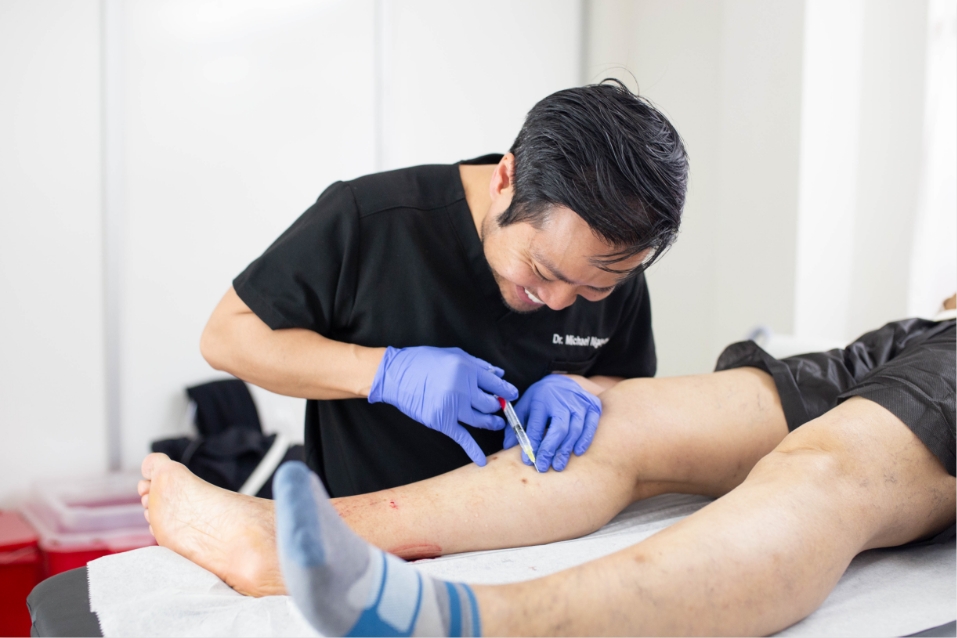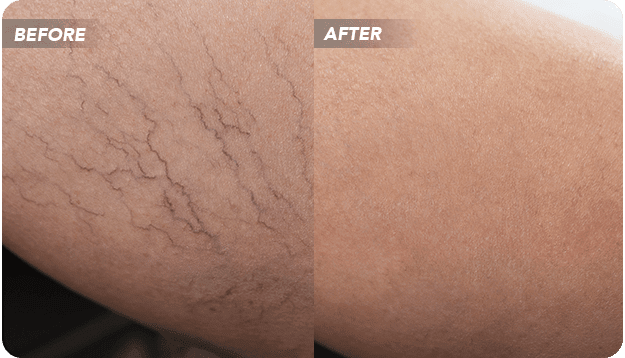Our state-of-the-art varicose vein clinic in New Jersey answers frequently asked questions about vein care.
Vein Treatment Clinic is a state-of-the-art varicose vein clinic in New Jersey with offices in Clifton and Paramus. Our centers are led by Dr. Sareh Rajaee and Dr. Todd Kobrinski, two of the best vein doctors in New Jersey specializing in minimally invasive varicose vein treatments, including radiofrequency ablation, endovenous laser ablation, and sclerotherapy.

This article’s goal is to provide accurate and medically-sound information on varicose veins and spider veins. There are lots of misinformation about varicose veins and vein treatments online — in fact, most of the articles on spider veins provide misleading information and half-truths. We want to set the record straight by providing relevant and medically-proven facts about varicose veins and spider veins.
Q1. Why do I have varicose veins and spider veins?
Varicose veins and spider veins are dilated blood vessels caused by excessive accumulated blood in your leg veins. Chronic venous insufficiency is the root cause of varicose veins and spider veins. Chronic venous insufficiency is a circulatory disorder wherein the vein valves collapse, causing blood to flow backward and accumulate in the leg veins. The consistent accumulation of blood in the leg veins leads to vascular dilation, leading to varicose veins and spider veins.

Q2. What are the early signs and symptoms of vein disease?
Venous insufficiency is a chronic condition, i.e., it worsens with time. The initial signs and symptoms of vein disease are extremely benign and can be misattributed to aging or exhaustion. That’s why vein disease is one of the most under-diagnosed diseases. Some of the warning signs and symptoms of vein disease include restless leg syndrome, leg heaviness, throbbing leg veins, leg swelling, frequent leg cramps, and spider veins. The signs and symptoms of vein disease worsen at the end of the day or after long periods of sitting or standing still.
Q3. What happens if I don’t seek varicose vein treatments promptly?
If left untreated, venous insufficiency leads to several complications and other diseases. The continued accumulation of blood in your leg veins leads to varicose veins. Since varicose veins are excessively dilated leg veins, they’re prone to bursting. If your varicose veins burst, you may suffer from profuse and uncontrollable bleeding. Besides varicose veins, untreated venous insufficiency also leads to skin diseases, skin discoloration, leg ulcers, and deep vein thrombosis (blood clots inside the veins). If the blood clots break away, they may travel to the lungs, risking a potentially fatal condition called pulmonary embolism.
Q4. Why do the best vein doctors recommend minimally invasive varicose vein treatments instead of vascular surgery?
Vascular surgery is the historical treatment for varicose veins and spider veins. Even though some vein doctors and vein centers continue providing vascular surgery, it has become obsolete due to advanced minimally invasive varicose vein treatment options. The best board-certified vein doctors always recommend minimally invasive varicose vein treatments because they have a nearly-perfect success rate, cause minimal pain, have a negligible risk of complications, and they conclude within an hour without a recovery period. As such, minimally invasive varicose vein treatments are better than surgical treatments in every way possible.
Q5. What are the best minimally invasive varicose vein treatments?
Radiofrequency ablation, endovenous laser ablation, and VenaSeal are the best minimally invasive varicose vein treatments. They’re all incredibly effective varicose vein treatments with almost perfect success rates, and they also have the same underlying goal but different methodologies. Radiofrequency ablation involves the use of thermal energy to collapse the diseased saphenous vein. Endovenous laser ablation involves the use of laser energy to collapse the affected vein. VenaSeal involves the injection of a medical adhesive to seal the diseased vein’s walls. Once the diseased saphenous vein is closed or collapsed, the accumulated blood flows to healthier leg veins, restoring effective blood circulation to the heart.
Q6. How do you remove superficial varicose veins and spider veins?
Ambulatory phlebectomy and sclerotherapy are the best methods to remove superficial varicose veins and spider veins. Treating the underlying vein disease doesn’t automatically remove the visible leg veins on your skin’s surface. During ambulatory phlebectomy, the vein doctor removes the superficial varicose veins through incisions on the skin. During sclerotherapy, the vein doctor injects sclerosant solution into the spider veins, hardening them into scar tissues that get absorbed by the body and fade away.
Q7. Are minimally invasive varicose vein treatments covered by insurance plans?
Radiofrequency ablation and endovenous laser ablation are the only minimally invasive varicose vein treatments covered by insurance plans because they treat the underlying venous insufficiency. VenaSeal isn’t covered by insurance plans because it’s a relatively new procedure. Sclerotherapy and ambulatory phlebectomy aren’t covered by insurance plans because they’re cosmetic procedures that only remove the superficial varicose veins and spider veins. However, in some cases, vein doctors may include sclerotherapy within the primary varicose vein treatment, covering both under the same insurance coverage.
Consult board-certified vein specialists in New Jersey today.
Vein Treatment Clinic has state-of-the-art vein centers in Clifton and Paramus. Our Clifton vein center is near the Ford dealership on route 46-E, close to the garden state parkway. Our Paramus vein center is near the Paramus Park Mall, just off the garden state parkway. For more information on varicose veins and spider veins, please schedule an appointment with your nearest vascular surgeons in New Jersey today.
To learn more about our accredited vein centers, please visit www.veintreatmentclinic.com. Our spider and varicose vein treatment clinics are certified by the IAC as vascular imaging centers and vein treatment centers of excellence. We have local affiliates in New York, Long Island, New Jersey, Texas and California, all of which are held to the highest standards of patient-centered, compassionate, care. We offer the latest technology at every location, and our harvard-trained medical directors lead a collaborative effort to ensure the best outcome for every patient we meet.
Don’t ignore vein pain. Here’s what to remember:
- Morris County Office
- Edgewater
- Hoboken
- Clifton
- Morristown
- Paramus
- Princeton
- Scotch Plains
- West Orange
- Harrison
- Woodbridge
- Woodland Park









